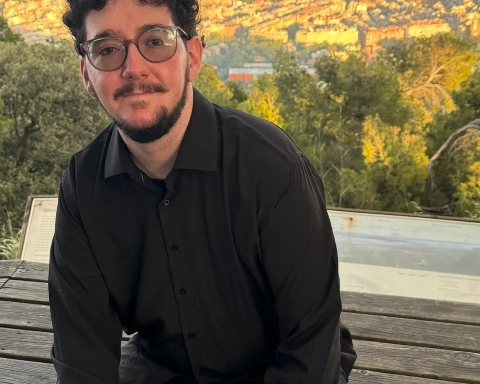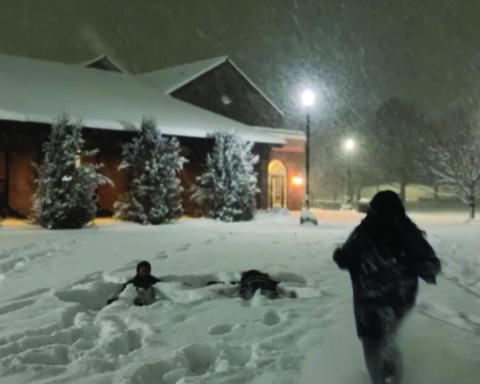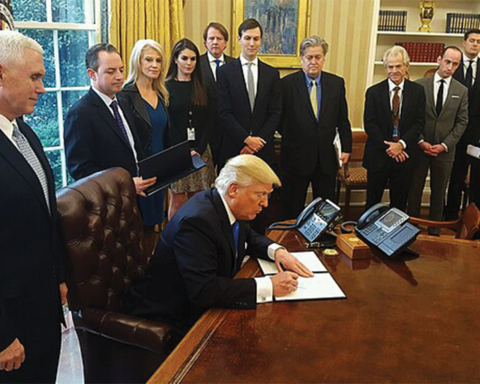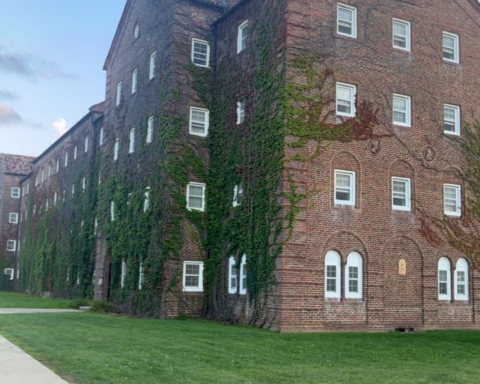The arguments for and against marijuana legalization discussed at panel
On Tuesday evening, St. Bonaventure University hosted the film ‘California High’ in the Dresser Auditorium of the John J. Murphy Professional Building, followed by a panel discussion on the topic of marijuana legalization.
Co-sponsored by SBU’s College Democrats and the Citizens Action Network of Southwestern New York, the panel included: Dr. Kevin Watkins, Cattaraugus County’s public health director; Dr. Vaijayantee Belle, an Olean neurologist; and Dr. Chris Stanley, an SBU theology and Franciscan studies professor, advisor for SBU College Democrats and a member of the CAN.
Stanley explained before the film that he had a personal investment in the topic of marijuana legalization. His younger son lives in California, where he works “in the industry” for a company that does marijuana processing. When in college, his eldest son developed a variation of schizophrenia possibly brought on by use of marijuana.
A few months ago, a task force suggested legalization of marijuana in New York. “Probably in the next legislative session, there will be a bill in the state legislature to legalize recreational marijuana in New York,” Stanley said.
The film discussed both sides of the argument in the discussion of the legalization of recreational marijuana in California. California, Massachusetts and Nevada ended up legalizing recreational marijuana in November 2016.
After the film, the members of the panel gathered to discuss their views on the legalization of recreational marijuana and the impacts it may have on the community. All three panel members made it clear they did not support the legalization of recreational marijuana. However, the panel did say use of marijuana for medical purposes could have its uses and needs more research. “It needs more studies for us to make a determination if it is a safe drug that can be legalized for recreational use,” Watkins said.
The panel stressed that marijuana does have negative effects and because so little research has been done, pursuing it as an alternative form of medicine is risky. Belle, who has a license to prescribe medical marijuana in New York, said she approves how cautious New York has been in its approval of marijuana.
“There is an impression that marijuana is safe and effective and better than all of the standard treatments, but this is worrisome, it is not as safe as they think,” Belle said.
With Cattaraugus County already at the bottom of health rankings in the state, legalizing another addictive substance is questionable. This year, the Cattaraugus County Legislature declared the county’s heroin related opioid epidemic as a public nuisance.
“It needs more studies for us to make a determination if it is a safe drug that can be legalized for recreational use,” Watkins said.
Watkins outlined the negative effects of marijuana through high concentrations of THC in breast milk, how marijuana affects the adolescent brain and how it can negatively impact certain aspects of brain functionality.
Stanley was the only one to see any positive benefits of marijuana use. One prominent reasoning being the tax revenue the government would receive from its legalization. However, he also said that it could lead to more reckless driving while impaired and the negative effects toward people with proclivities for mental illness.
Overall, the panel was against the legalization of marijuana for recreational use, but would like more research to be done on its medical properties.
“A lot of people would like to see marijuana legalized for recreational use, but a lot of people don’t want to see it used, due to its social connotations,” Stanley said.
With states like Massachusetts and Vermont already legalizing recreational marijuana, it is yet to be seen if New York will follow suit.
“We will know more in the next two to three years when we have more research and data. For now, we need to take a cautious approach,” said Belle.
By Amber Canbek, News Editor and Brendan O’Leary, News Assignment Editor
canbekam16@bonaventure.edu olearybm16@bonaventure.edu






